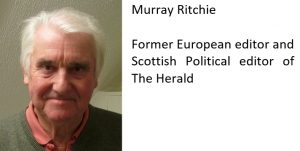Labour views with horror its abysmal poll ratings. The thought of a possible early general election is too alarming to contemplate. Just think then how bad things are for Labour in Scotland where the crisis is even more desperate.
Jeremy Corbyn’s miseries are mild compared with his party’s troubles north of the border where the unthinkable could happen in May. It could be that Glasgow, the greatest Labour citadel in the United Kingdom (UK), could fall to the Scottish National Party (SNP) in local elections after almost uninterrupted power for more than half a century.
Corbyn’s party trails the Tories by 13 per cent across the UK, but in Scotland Labour is a full 10 points behind the Tories who in turn are 20 per cent behind the rampant SNP. It has never been so awful for Labour which, not so long ago, returned almost 75 per cent of Scotland’s MPs and ran Glasgow with 90 per cent of its councillors.
To recover some of its lost popularity Scottish Labour is now gambling on a proposed new Act of Union between England and Scotland as a way of avoiding the looming electoral wreckage. The party is branding its reaffirmation of unionism as federalism (sounds more friendly to some Scottish ears) and this escape plan has reportedly been given the Corbyn blessing.
If, as expected, Labour fights the Westminster elections with federalism as its big constitutional idea to avert a British break-up, it can thank Scotland where the talk is again of another independence referendum.
Labour had a straight choice – either back the Union, and therefore the unpopular Tories, or back independence and therefore the rampant SNP. Kezia Dugdale, Labour leader north of the border, knew she would be condemned either way. But her party’s paranoia about the Nationalists drove her towards the Union. It probably won’t work.
But these are strange political times in Brexit Britain. For all those who see Labour’s clinging to Unionism as a catastrophic misjudgment, there are those who see backing independence simply as a non-starter.
It has never been so awful for Labour which, not so long ago, returned almost 75 per cent of Scotland’s MPs and ran Glasgow with 90 per cent of its councillors.
Embracing Tory efforts to preserve the Union in the 2014 independence referendum cost Labour all but one of its seats in Scotland as disillusioned supporters flocked to the SNP.
But now, with Brexit looming, it seems some are also moving to the Tories who suddenly seem a touch less toxic than they were this time last year. Scottish Tories have found a personable leader in Ruth Davidson, while Corbyn remains deeply unpopular outside the party faithful.
Ms Dugdale follows the Tory line that the Scots voted to maintain the Union with England by a convincing 55-45 per cent majority in 2014. True. But this ignores the fact that the same Scots voted by an even more convincing 62-38 per cent majority to remain in the EU after being told voting ‘No’ to independence was the only way to continue as European citizens.
Having chosen the Union, Ms Dugdale has turned her back on up to 40 per cent of Labour supporters who voted for independence. It could be her undoing.
Her spin is that Brexit means a vast array of powers being repatriated from Brussels to Scotland in areas already devolved – with more to come if the UK adopts federalism.
And she believes a federal Britain would nullify the SNP’s independence argument. “The UK is more important than the EU,” she is fond of saying.
But some of her own party critics believe Labour’s popularity can only be recovered if and when Scotland becomes independent. That way the party could at least look forward one day to governing again, freed from the influence of the traditionally centrist party head office in London.
Ms Dugdale flirted with the idea, but decided against. It might have been her biggest mistake.
Adopting SNP policy is still too repellant for Labour, it seems, where tribal animosity towards the Nationalists – reciprocated most of the time – is notoriously poisonous.
Westminster-style annihilation in local elections will probably be avoided because of the single transferable voting system (STV) but if, as expected, Glasgow falls to the Nationalists then Ms Dugdale herself will probably be job hunting.
Labour’s troubles are, of course, sweet music to Nicola Sturgeon’s SNP. The looming hard Brexit would see her forced to call a second independence referendum. Yet the signs are that she cannot be certain of winning it. Playing for time, she has ruled out indyref2 during 2017.
If she was to lose it again, both she and Ms Dugdale could yet be flattened by the wrecking ball that is Brexit.
By Murray Ritchie





